
27 minute read
In conversation with… Victor Lugger
In conversation with...
His London restaurants, Gloria and Circolo Popolare, have caused a sensation in the hospitality industry. That’s in addition to seven trattorias in France and a 50,000 sq ft food market, La Felicità, in Paris. Victor Lugger, with his partner Tigrane Seydoux, is one of the most successful operators on the current restaurant scene. What’s his secret? He tells Lisa Markwell about the significance of everything from lowered floors to heightened expectations
Advertisement
In just six years, the French business partners Lugger and Seydoux have created the highly successful portfolio of ‘Big Mamma’ Italian-themed restaurants and show no signs of resting on their laurels. Lugger in particular, who is just 35, moves through the newest opening, Circolo Popolare in Fitrovia, with a sense of urgency – noticing everything from the customer questioning the waiter about his dish to a candelabra that needs adjusting.
He has relocated from Paris to London with his wife and two small children – not just to keep an eye on Big Mamma’s newest openings, but because he loves the capital, from its Indian restaurants to swimming in Hampstead ponds. He shares a love of puns and knockabout humour with the
Brits, as witnessed on the menu of the restaurants, and cocktail cups based on women’s breasts (jugs, geddit?!).
Lugger employs an almostexclusively Italian staff, the better to transport diners to a trattoria atmosphere, but isn’t overly concerned about the impact of the Brexit situation. We sit talking in the courtyard at the back of Circolo Popolare with coffee for an hour, occasionally joined by his adorable young daughter, who is eating inside with the rest of the family. He’ll occasionally talk to a passing waiter, in flawless Italian, of course.
As I leave, he asks me to taste a new dish that head chef Salvatore Moscatto is working on, a wedge of fried macaroni cheese. It is indulgent, rich and quite delicious plus, like so much in the Big Mamma universe, a bit over the top.
Let’s go back to the beginning, you started Big Mamma in 2013. What made you want to open a
restaurant?You had a successful
career already. Actually, the start point was my partner Tigrane Seydoux and I wanting to do something together. We hadn’t worked together before, but we thought we’d try to do something that I like and he likes. We’d look at thousands of ideas and around us there are all these guys, our generation, creating tech companies, creating a new need, giving a new answer to that need… and making shit-loads of money with great success. We couldn’t get that, and by the way we didn’t have a lot of money behind us.
We couldn’t find something where we were excited about. In the end we ended up in restaurants because that’s what we were both passionate about. We said, “Let’s make restaurants.
Great. Let’s make restaurants. At least now we know what we’re going to do.”
Has your success been built on being the hot new thing?
I’ve never bought into that idea about it’s a tough industry or that one minute you’re fashionable and then you’re not. It’s absolute bullshit, I would say. If you cook good, cheap food, serve it with a smile, in a nice location, it works all the time everywhere - whatever food you’re serving, whatever bracket of price you’re in. Like the River Café – it’s been there 20 years. Look at Trullo - it’s consistently good and they could open a second one and a third one next to that, if they were consistent in quality, served with a smile at a proper price in a nice place, it would work. Period.
So you decided to open a restaurant. Then what?
We said, “Okay. What are we going to cook?” We looked at thousands of ideas and lots of kitchens. We needed experience. We didn’t know shit about operating a restaurant. I could cook for a dinner at home. I’m actually passionate about it, but I’m not a chef. When I say I’m not a chef, it means ... I can create any of these [Circolo’s] dishes. I participate a lot in many things here, but a chef is about how you do it at this volume with consistency and … not how you do it, but how you empower people around you to do it with volume, consistency, energy, and passion over time.
I don’t give a shit about food and the older I get, always less. It’s about the people. It’s about the conviviality. Food fuels a discussion and it’s a way to say I love you. And thank you. To express gratitude. That’s food.
I think a lot of people feel this way about restaurants: if the food is okay and the service is great, they’ll go back to that place time and time again. If the food is amazing, but the service and the atmosphere is ... neutral to bad, they’ll never go back because it’s about much more.
I couldn’t agree more.
You’re young, this is your second career. Do you think you’ll always want to be in restaurants?
It’s a tough job. We realised this is really hard – it’s like tackling Everest from the north face.
A friend of mine told me, “Being an entrepreneur is taking 100 decisions a day and you have no fucking clue about it.” And that’s where values, I think, are important because I don’t have the time to think it through. Anything you do, you have to be able to do it for 100 years.
And so we said, “Okay. What can we do that is sustainable?” Not something that is a good business or it’s a market opportunity. We have to be passionate about it. If not, it’s going to be too hard. That fuelled a second principle which is - everything we do, we try and do as much as possible out of passion. When I say it like that, it sounds like bullshit. Practically, I can give you a few examples that are not bullshit, and they’re proven to be drivers of great success – on the business side and the human side. For instance, internalizing the design studio. You’re a restaurateur and you’re saying, “Now I’m going to do my own design.” It’s the toughest thing I’ve done in two years. It’s a nightmare. It’s really hard. It’s complicated. It’s a totally different
Victor
Lugger
job. Here, we literally lowered the floor to make more of the space!
Looking at the future, our job is about creating experiences for people. That starts with food, but it goes beyond that, so it was the best decision we’ve ever done.
OK, let’s talk about the subject exercising the hospitality industry right now, Brexit
The other day I was with Tigrane and said, “Do you realize that when we decided we would go to England, Brexit had been voted already?” People are talking about it and everyone’s asking me if I’m shitting my pants - which I’m not, but maybe I should. Did I discuss that with my partner a year ago when we decided and I moved my family? No. We came here because we were excited to do that and I think it’s a good choice. Even if there that starts with food, but the playlist is important, the soap is important, the design, of course, is important, the smile is important, the way people are dressed is important, et cetera, et cetera. And we try to do that in a price range that is affordable to most people. By most people, I mean 90% of the people.
In my restaurants I see everyone from workers that are on the building site next door and I see billionaires. I see single mothers with five kids and I see grandparents and grand, grandparents with their youngest. I see people on Instagram and I see people who don’t have a phone on the table.
In a way, we haven’t invented anything. A traditional restaurant is a 360 experience: the table is great, the service is great, the menu is great, the soap is great. It’s just that it costs you 500 euros per person or 400 euros and I say, “Oh, I didn’t know we did this dish. Oh, it’s because it’s not my restaurant. It’s just exactly the same light, the same angle, the cutlery, the same thing.” Well, it’s the game. It’s fine. And actually, even though I’m saying the plate thing drives me crazy, actually, truly, it doesn’t. If I’m honest, it fuels and boosts my ego. It definitely boosts the chef ’s.
is a bad Brexit at the end of the year, it’s going to be fine.
I have two restaurants in the UK. They’re good and cheap and serve with a smile. Brexit or not, it’s going to be fine for them. Brexit might kill me a few points of profitability. Okay, that’s fine. We’re going to swallow it and we’re going to survive this.
What do you think is the secret of your appeal?
We do things very much organically and we try to be aware of what we like and what we’re going to like tomorrow and that’s what we offer to people. So far we’ve been lucky because we are, I think, connecting with the people in what we offer. It’s a 360 experience
And it also fuels a will that we had that before. Which is ... I get bored very, very easily. We always try to do new things. There is very, very few things that you will find here and at Gloria, not to mention in Paris. Always innovating has always been an attitude for us. That’s why every restaurant is different. That’s why every menu is different. That’s why every team is different. That’s why every artwork is different. The fact that some people are being inspired by us, it’s fine and
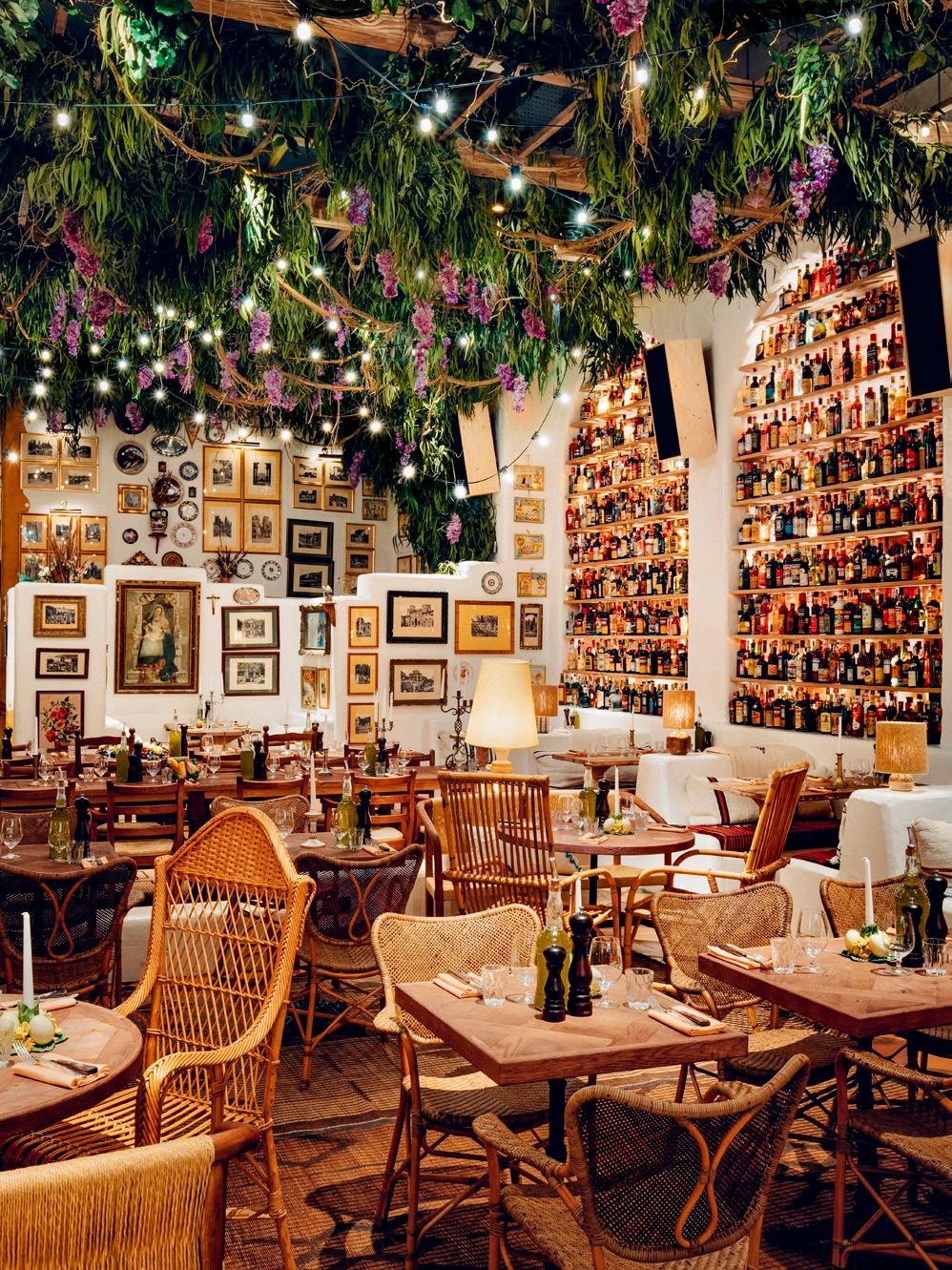
per person. How can we do that for 30 euros per person or 25, actually? Doing that at this price, this is what we’re interested in.
Okay. Let me turn it around. In the time since you opened, have you seen people imitating you?
Oh, I’ve seen many people doing similar things as we do. Are they imitating us or are we imitating them? I wouldn’t be that arrogant. But I do see people doing more grand design and stronger décor. We see a lot of them of course. Or people giving more care to the cutlery. I often see people turning plates over to look at base. This makes me crazy.
Now sometimes I look at Instagram
I’ll be frank, we’re inspired by so many people.
But one of the words which is attached so much to your restaurants is ‘extra’. The lemon meringue pie is super tall and the lasagne has vast layers and so on. Was that something that you set out to do?
No, no. This is deep rooted in my partner and I - in my childhood, in my education. It’s “If it’s not too big, it’s not big enough. If it’s not too much, it’s not enough”. When I was a child and I came home with an 18 out of 20, my father would say, “Why not 20?” Well, yes, he’s German.
I try to be ‘less in more’ in many

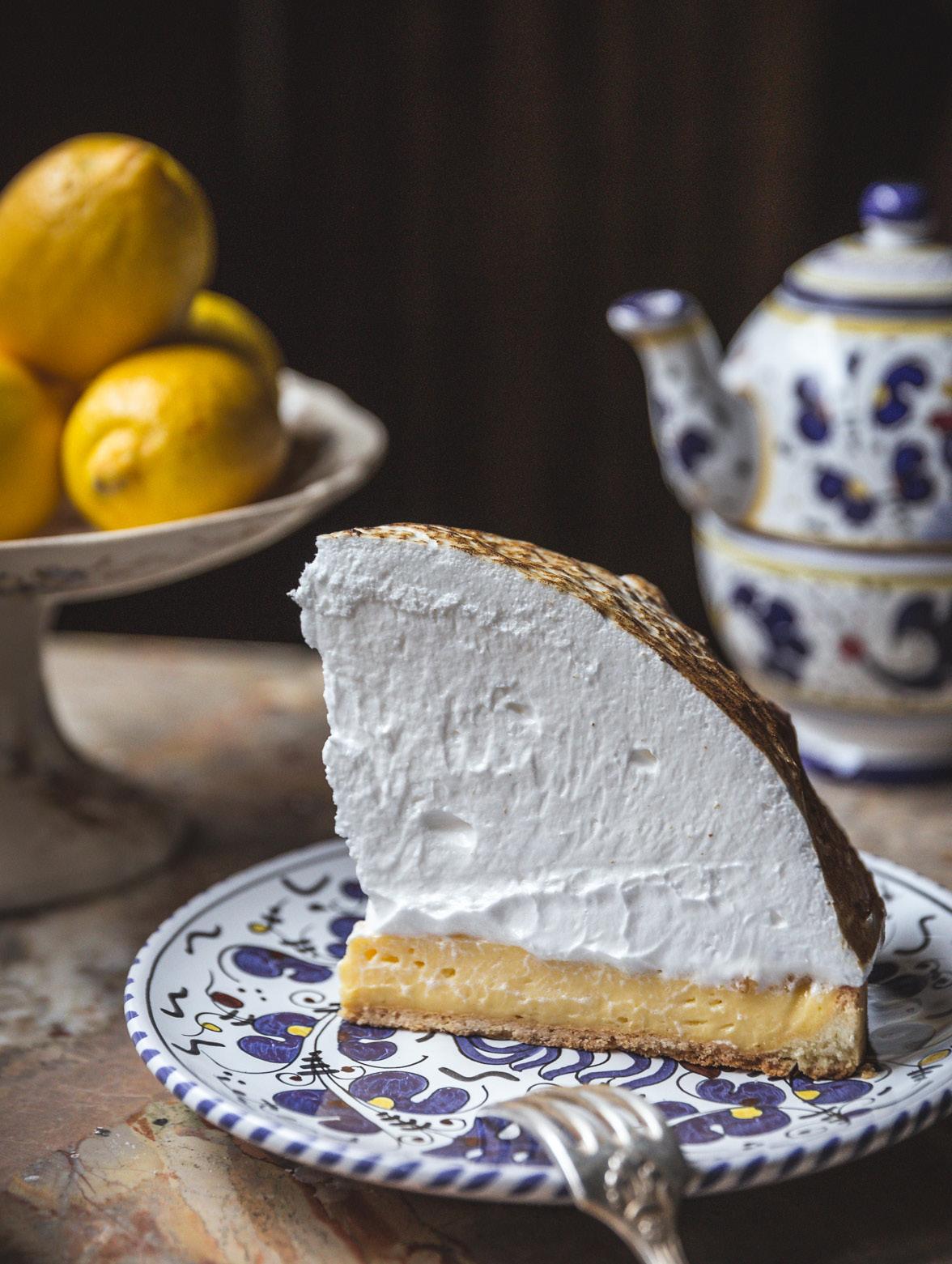

aspects of my life, but not in food! More is more feels good sometimes, like in a dessert.
In our social media age, when everyone wants to go to ‘the new place’, photograph it and move on, do you worry that people are going to move on from you? We are in a city which is saturated for restaurants.
Of course I worry. It’s my first worry. It’s my very first worry. I think we can succeed. The first reason why is because we’ve been in business for more than five years in Paris and I’ve got more clients today than at any other time and my first restaurant, East Mamma, is more packed than ever before. So I know we can do it.
It’s a very legitimate question that I ask myself every morning with my partner and the team. Every time I go to Paris, which is every week, I visit my restaurants and I say, “I don’t want to get bored with these restaurants.” As I said, I get bored very fast. Faster than anyone I know and I just make sure I don’t get bored with my restaurants. If I don’t get bored with my restaurants, probably no one’s going to get bored with them. For instance, we’re removing the carbonara … which by the way is the best-selling dish. I thought, “Okay. Let’s change it.”
That’s ballsy. Changing the subject, who do you rate in London?
I used to go to Trullo very often before I opened a restaurant. Now I spend my life in Italian restaurants so I’m afraid I don’t go that much. A place where I like to take people is Spring; that’s where I go with my wife. When we have friends over for the weekend, we take them to Trishna. One of the reasons why I moved to London is because I wanted to eat Indian food. Actually, it’s the real reason why we moved to London.
Do comments such as restaurant reviews or posts on Instagram – good or bad - affect you?
Of course I do react. My work is to listen to ... in French we would say, “Weak signals.”
Text messages giving me praise, messages just saying they came in. Every time I say, “Oh, what can we improve?” And of course I read the reviews. We follow every review on the internet too, very closely, and look at the average rates on website. There are 1,000 people who say shit on TripAdvisor, of course, but there are so many comments I’ve aggregated across the board and it’s very, very, useful information.
I would say the difference between the English customers and the French customers is probably ... the guy complaining here, making a point about not being happy, raises a stronger voice. I get two emails a week saying, “Oh, I paid the bill but I didn’t see that there was a pound for charity. Can you reimburse me for a pound.” I have people saying “the pasta for two, it’s £16 per person, but you charged me twice.” Yes, it’s a dish for two and you were two. “But I didn’t get that. Can you reimburse me?” People will not do that in France. They just don’t send emails.
The collapse of the mid-market restaurant is well documented. For instance, the downfall of Jamie Oliver. He’s recently said the reason why Jamie’s Italians failed was because it wasn’t at the right level. It would have been easier to open posh restaurants. The middle market is difficult. People don’t appreciate or understand it. What do you feel about that?
To be honest, I don’t know. I’m a small restaurateur. I have two restaurants. What the fuck do I know? Honestly, I don’t know. He had 14 or 16. Some people have 400. I have two restaurants and I’m not going to do 14 in four years, I can tell you that. Because I wouldn’t know how to do it. At least not in a way that I’m going to be happy with in 20 or 100 years.
The question I ask myself is, How do I use my time? Am I focusing on something and taking the time to do it right? Having time to do charity. Having time to do team building. Having time to do events. Having time to do fun things. Having time for my family. Am I working 80 hours a day to just copycat things because I need to do more restaurants? No.
One of the biggest challenges must be hiring and keeping a good team. You seem very proud of yours.
It’s really easy. When you come and work in a restaurant every day, you get better at it. This is my team’s talent. Every day ... my talent grows. This is the reason why we exist. The reason for this company to exist is to change people’s lives and I’m talking about the people in the team, because I’m not changing my clients’ life. If they don’t eat here, they’re not going to starve. The only lives we change are those in the team and the baseline of our company is: change people’s life with pizza. Actually, you can reinterpret with peperoni, with coffee, with whatever, but the reason why we do that is because we want to change our lives.
The talent grows organically like this, which is actually exponential. Growth comes as the talent grows. I try and open restaurants at this pace. If I go faster, I’m going to open shitty restaurants because I’m not going to have enough talent.
So you’re not planning on moving on to a third career?
The reason why you go to work every morning probably changes by the time you’re 20 or 30 or 40 or 50 or 60 or 70 and changes depending on the success you have. When you reach a certain level of financial and professional (or ego and media) success, you realise how vain that is. Well… some people never realise and want always more.
If you realise how vain that is, at first you’re facing some emptiness. Okay, so why am I getting up again tomorrow? And then you realise that you’re doing it because the first thing that got you excited is the people you’re doing it with and that, actually, it’s as good as it gets. And it’s great.
I hope I would be proud to tell my grandchildren about these people in 20 years. I will definitely not be telling my grandchildren that I did a restaurant in London that some paper, I can’t even recall which, said it was the hottest place in town and that there were 30,000 bottles. Yeah, okay. Who cares?
I have a fucking great team and I give people pleasure every day. How fulfilling is that job? I don’t want to do anything else.
Love story

What’s your favourite belonging, something that makes you truly happy? Lisa Markwell asked five hospitality figures to name theirs. Photographs by Harriet Clare and Sabrina Dallot-Seguro

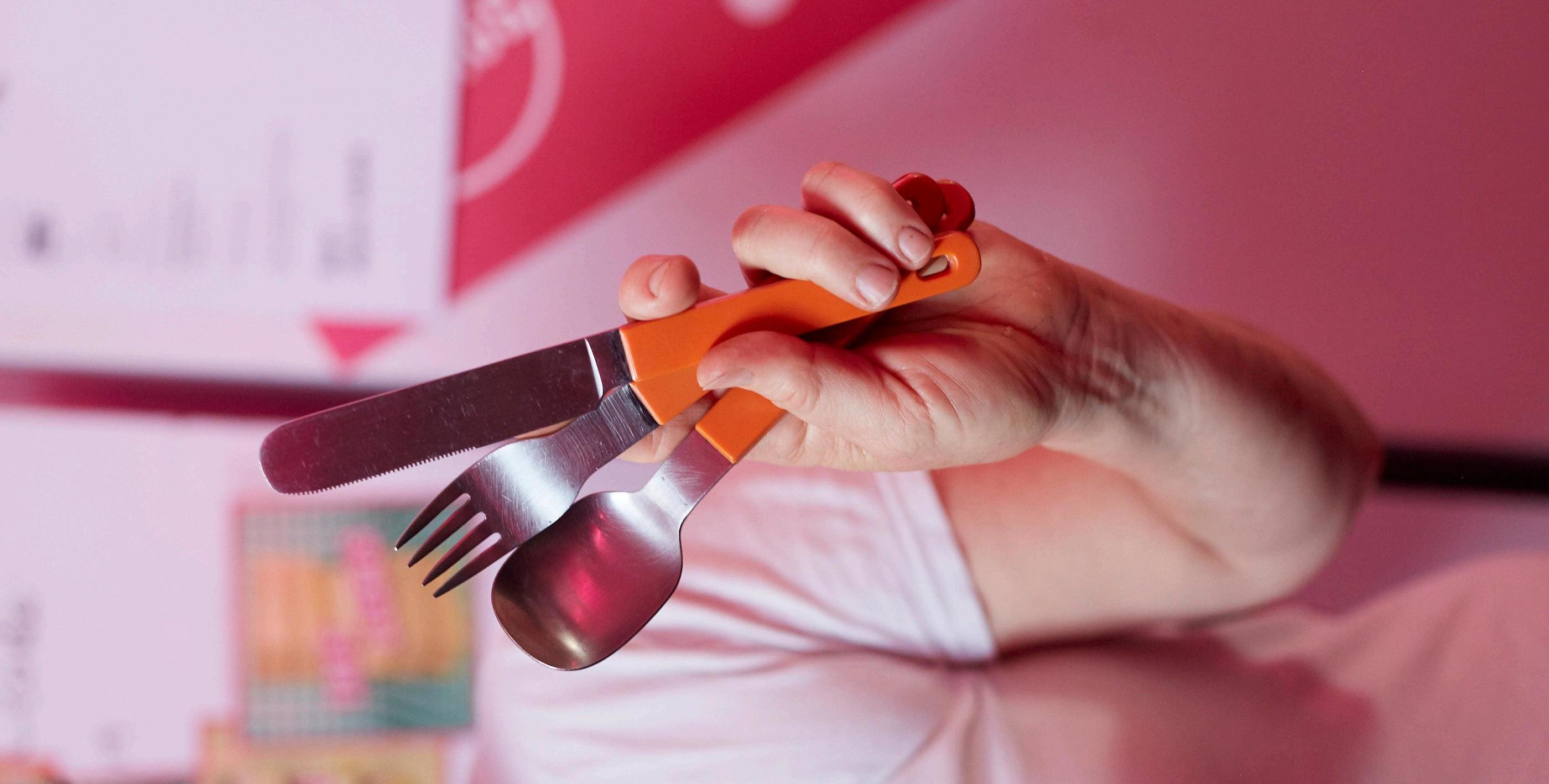


Tom Brown

Tom Brown, chef/proprietor of Cornerstone in Hackney Wick
It’s only been open just over a year, but Tom Brown’s Cornerstone has quickly become a classic restaurant
“My grandad was a massive Arsenal fan and me and my brother used to watch the games around at his house, so I’ve always been a big Arsenal fan. Obviously when I moved from Cornwall to London it made it a lot easier.
I wanted a season ticket, but there’s always been a notoriously big waiting list. There was a receptionist at the Capital whose son had one. She said, “I can put you in touch with someone who often gets tickets”. So I met up with these guys and became very good friends. Now I do it as a half-share system with one of them. It works pretty well, especially well for me because Saturday afternoon kick-off is the worst time, so I’m always thinking of the Sunday games.
The amount of times I’ve come away saying, “I fucking hate football.” But I do really love it. It’s like when you go to a really good restaurant, it doesn’t matter what you order, it’s just an amazing atmosphere and experience. It’s almost like a religion in a secular society. I think that the actual 90 minutes is almost like the least important part of it. It’s meeting up, brunch at Black Axe Mangal, then get a few pints, and off to the game. Aaron Ramsey came in for dinner and offered to let me watch a game in his box. I was like, “Err, fucking yeah.” It was mind blowing. But you’re removed from one of the things that is so good about football. You go to sing, you go to shout, “the referee’s a wanker.” Know what I mean?”
Terri Mercieca
Terri Mercieca, owner of Happy Endings in various locations
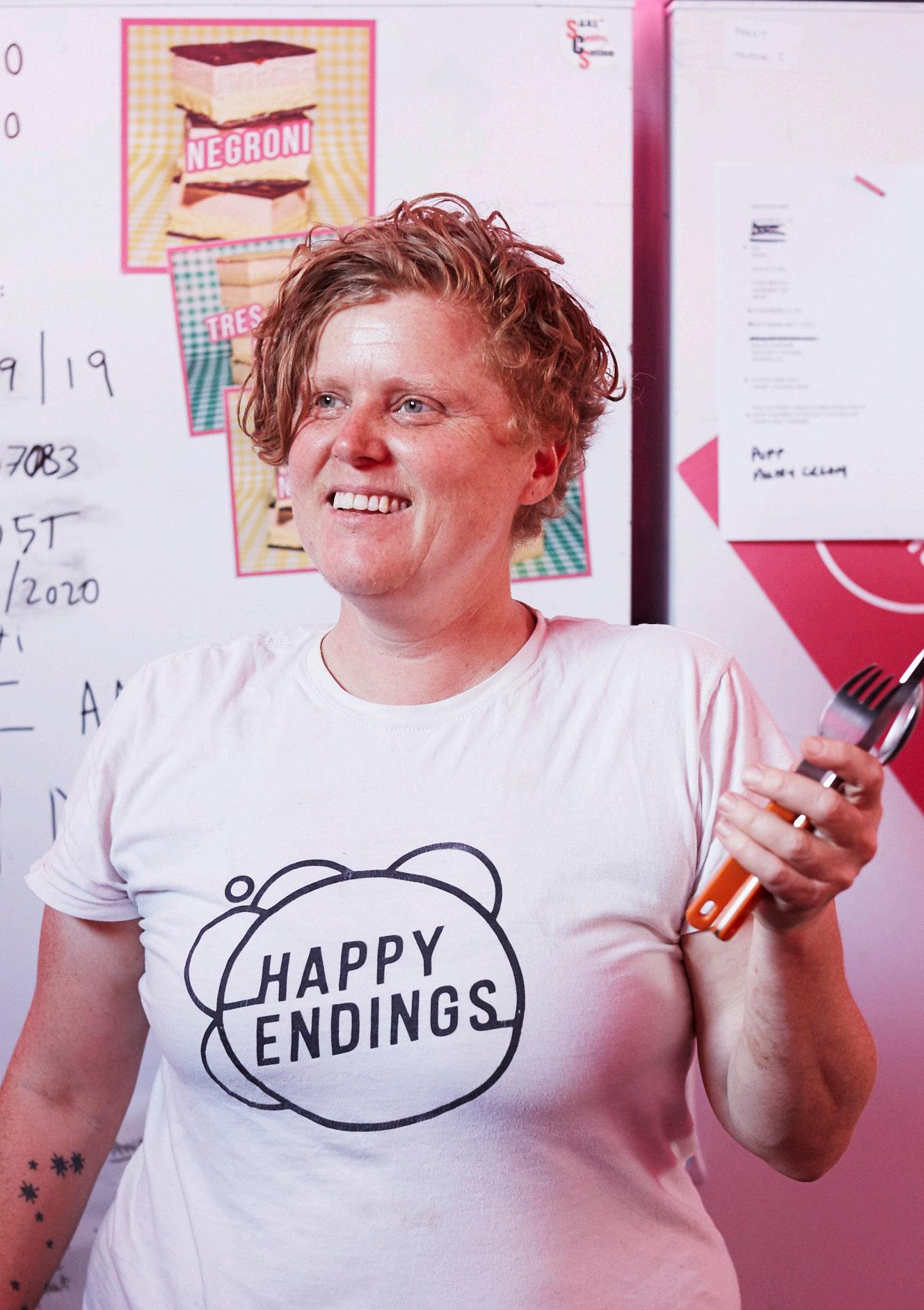
Terri Mercieca runs the wildly popular ice-cream company Happy Endings, which as well as supplying restaurants, also sells at events and festivals. At this summer’s Lost Village, they sold more than 2,000 of their distinctive ice-cream sandwiches
“This is my nana’s cutlery. She’s passed away now but she was Italian and used to make the most wonderful food – as soon as we’d walk into her house in Sydney, we could smell the pasta with Napoli sauce and we knew we were in for a treat. She would have a big bowl of pasta with loads of cheese and you would walk straight in the door and eat the pasta with this cutlery! When she died my siblings and I took a set of cutlery each to remember her by. The other day I was unpacking my stuff and was ‘Marie Kondo-ing’ my house. I came across this set of cutlery and thought ‘they’re still so nice. Yes, they do spark joy!’ Then I made her sauce and sat with my girlfriend eating pasta with these. I think she was my favourite person in the world, so compassionate and loving. She loved cooking and I think she’s probably responsible for us all comfort eating, because she was such a soothing person, very loving, through her food. You would always know that if you were going to her house you would be fed well, totally laugh your head off, have cuddles and play bingo. She was a proper Italian! I only have one of each piece, but I’m pretty sure my sisters and brother have the same sentimental feeling about them as I do, so I can’t take theirs…”
Max Halley
Max Halley, owner of Max’s Sandwich Shop in Stroud Green
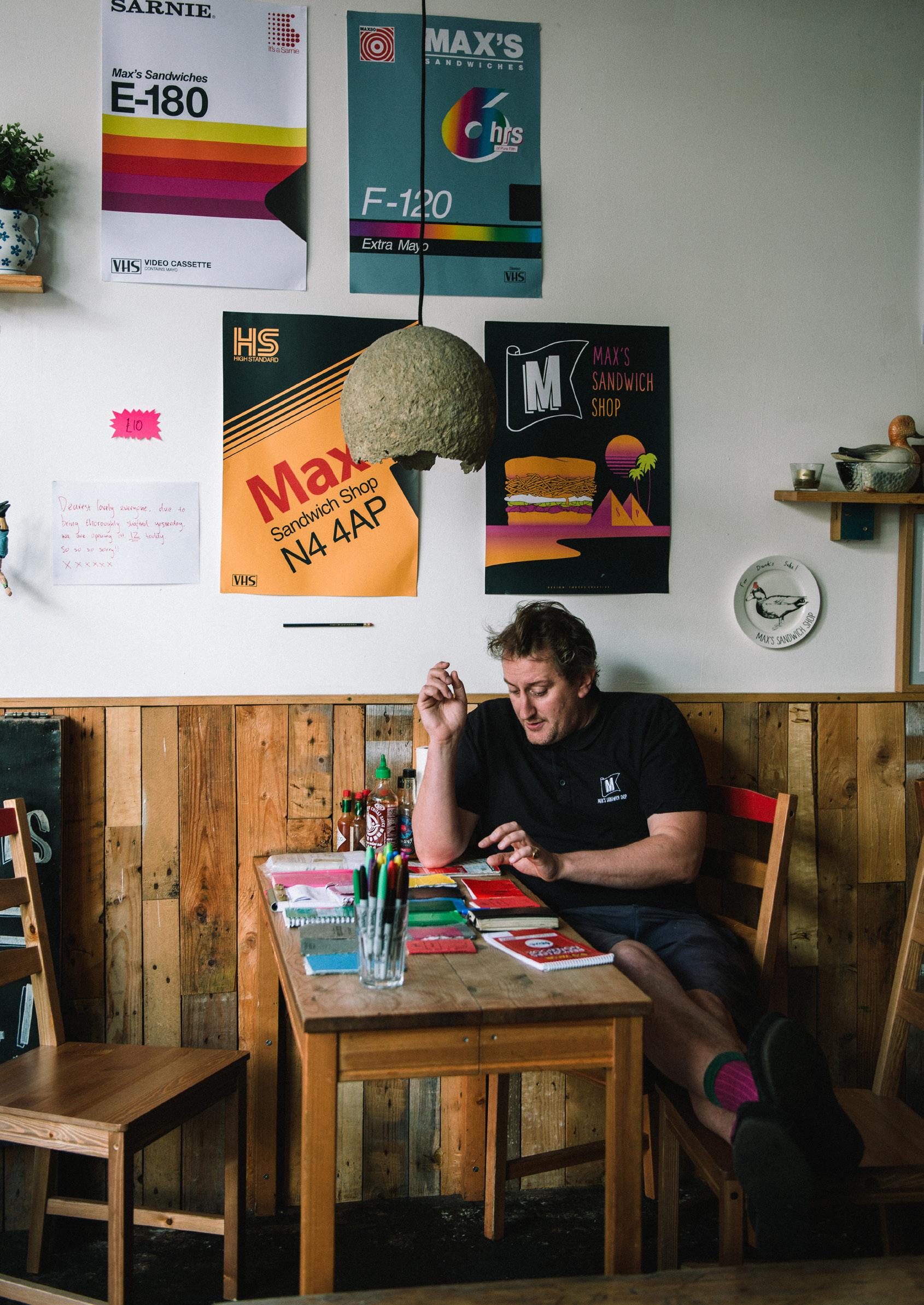
Max Halley is the owner of Max’s Sandwich Shop in Stroud Green, which has a cult following for its vast, quirky gourmet sandwiches. Last year he published Max’s Sandwich Book, which is on sale in the restaurant, with non-signed editions at a discount
“Everything good that has ever happened to me, that I have made happen myself, has happened as a result of notebooks. I never go out of the house without one. My dad’s a journalist and I was taught that you never ever leave the house without a notebook and pen. I’ve got a short-term memory like a squid and I will forget otherwise… I’ve got notebooks going back to when I was at school!
I like pens too, especially Sharpies. I’m not into Moleskine, it’s a rip off! I’m a utilitarian notepad guy, apart from my posh desk one, which my mum gave me years ago.
I have different sized notebooks, from the desk-sized one down to a pocket size that gets tucked into the trenchcoat, which is part of my default outfit – black polo shirt and shorts. I’ll sit on my own on a Sunday night and go back through my week’s notes and sometimes I might re-write them! So, I’ve got my desk pad and the spares and then I’ve got these little thin ones. Sometimes they get so bashed that I gaffer tape them to try and stop them from falling apart so much!
It’s not all just work stuff I write down, it’s everything I ever think about! The wonderful thing about the notebook, which my Dad was always keen to hammer home to me is that it’s not about the notebook, it’s about the act of writing something down. It’s almost like editing and keeping on top of oneself somehow.
The really good ones I rip out and I put them on my wall. The core stuff is always in the middle, like ‘don’t forget mum’s birthday!’ or ‘get front door replaced at sandwich shop!’”
Mark Wogan
Mark Wogan is the proprietor of the hugely successful mini-chain Homeslice. The pizza restaurants have been a London fixture for more than six years now, recently celebrated with special editions for each of the seven branches
“I first got introduced to green Tabasco by Richard Corrigan, about ten years ago. He recommended it to go with a fish pie, like a posh ketchup. I really think Richard is, pound for pound, the best cook I’ve ever met.
Then discovered subsequently that it goes with almost everything, and has been my goto condiment ever since. And I have it with everything.
When you’re working you get home late, you can’t really be bothered to cook anything significant, so how do you make it interesting? You put green Tabasco on it. It is honestly one of the best things you can have – also, in the morning, a fried egg on toast… green Tabasco! It’s phenomenal, one of the greatest inventions since the wheel.
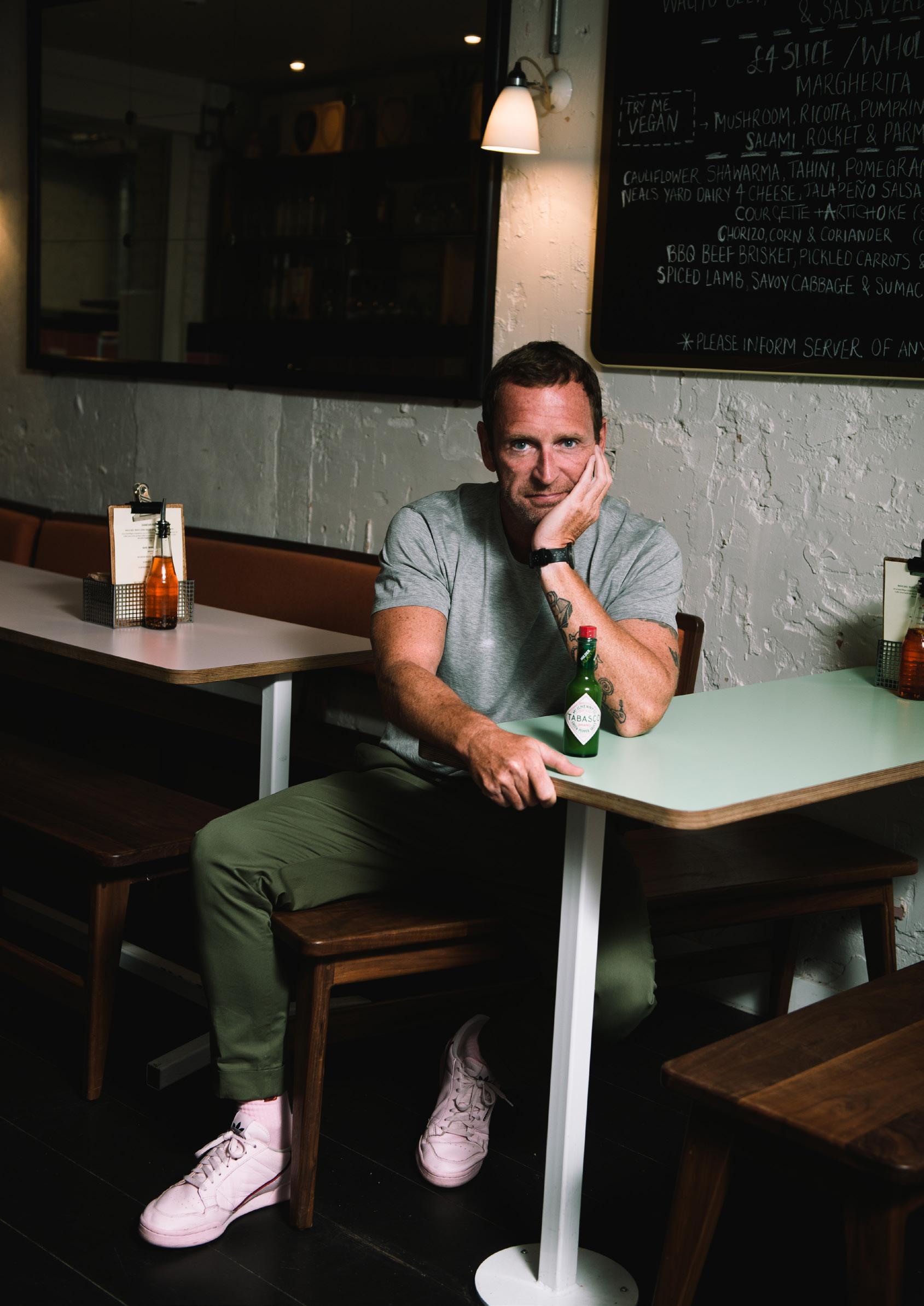
Mark Wogan, owner of Homeslice Pizza, various locations
It’s a lot milder than red Tabasco which, when you put it on, that’s all you taste. This enhances food. A splash of that on a cheeseburger, and it just lifts the whole thing up. So it can bring joy to almost every single food stuff.
It’s almost impossible to get hold of the big bottles, so I order them in bulk on Amazon. I give it to lots of people as presents to change their lives. And I start to get slightly anxious if I’m down to one bottle.
James Cochran

The winner of this year’s Great British Menu, chef James Cochran has had a chequered few years, losing control of his own name at one point. However he is now running the highly successful 12:51 restaurant in Islington and a new project, GOAT, at Boxpark Croydon
“So, I’ve always been wanting to get a dog for ages and then my girlfriend decided to say “Let’s get a dog, let’s get a dog” but at the time it wasn’t practical.
They take up a lot of your time and I had a lot going on with work and the struggle to gain control of my own name.
Finally back in 2017, we managed to find a flat that had a garden with it and then I was like, “I don’t really find Schnauzers as really proper dogs. I just want a proper dog, I want a big massive fuck-off dog.
I did loads of research online, and then I knew exactly what type of breed of boxer I wanted to go for. It’s either a brindle or this cheeky little number. Then when I first saw her, she literally came to me and started licking my face and it was like, ‘this is the one’.
James Cochran, chef/owner of Restaurant 1251 in Islington
We called her Bella because my best mate’s dog was called Bella, who passed away. It’s like having a nanny for a child: we pay something like £500 a month for dog-walking. Luckily the restaurant is doing well, it’s really established now and I have a great team. We’re selling merchandise and I’ve been able to do a few festivals. Plus Jess is freelance, so that enables us to have Bella with us a lot.
The joy she’s brought us has been unbelievable, and I’ll never change her for the world. Me and Jess, we love our dog more than we actually love each other. We won’t split up, but if we did… well, Bella has my surname!”
Gender pay gap in hospitality: what does yours look like?
Howard Kennedy is a London based, full-service law firm, specialising in providing straightforward advice to entrepreneurial businesses and individuals on domestic and international matters. Its staff have a deep understanding of the retail and leisure sector, helping operators seize the opportunities generated through changing consumer tastes. Lydia Christie looks at gender pay gaps
Sponsored content
Since compulsory gender pay gap reporting began in 2017, the issue of pay equality has rarely been out of the public eye. From BBC presenters to supermarket checkout workers, every sector has skeletons in its closet. And hospitality is no exception. Whilst CODE’s survey data suggests that the gender pay gap among respondents is slightly lower than the overall national average, there is certainly no room for complacency, with the gender pay gap for front and back of house jobs widening in the past year. So what can hospitality businesses do to address this?
Equal pay audits It’s often said that having a wide gender pay gap doesn’t mean that a business is breaking equal pay law. That’s true – a gender pay gap is often the result of women being underrepresented in senior roles, while equal pay is mostly about paying men and women the same pay for the same work - but it comes with a health warning. One requirement of equal pay law is that men and women are paid the same for work of ‘equal value’, i.e. work which is equivalent in terms of effort, skill and decision-making. It’s worth reviewing your pay structure to assess whether male-dominated roles are paid more than female-dominated roles and whether there are legitimate and non-discriminatory reasons for any differences. Removing such discrepancies could significantly narrow some businesses’ gender pay gaps, as well as reduce the risks of legal claims. Although equal pay litigation has historically been more common in the public sector (often funded by trade unions), private sector employers are increasingly being targeted, with ASDA and Tesco both facing costly multiclaimant claims. In our experience, it’s better to assess and tackle such risks proactively, with specialist legal advice where necessary, rather than wait for claims to be brought.
Retention and progression Across all sectors, including hospitality, a major cause of the gender pay gap is that female staff don’t return after maternity leave (often because of a lack of flexible working opportunities) or see their careers (and their pay) stagnate after they have children. Whilst the demands of hospitality don’t always mesh easily with flexible working arrangements, it makes good business sense to try to reduce maternity attrition rates. High staff turnover has substantial knock-on effects, including the management time lost to recruitment, the costs of using agency staff or recruiters, and the need to train up staff to replace experienced leavers. And with Brexit set to make recruitment even tougher, we are seeing more hospitality businesses making real efforts to hang on to the staff they have.
Some examples include: • ensuring that staff on maternity leave are given access to training, having discussions about career progression before they go on maternity leave and having open discussions about working arrangements when they are due to return.
• ensuring that part-time staff don’t face unnecessary barriers to promotion and career progression, as this is also likely to result in women being under-represented in higherpaid roles. • putting in place defined policies on flexible working and career progression may help to embed a new mindset among managers.
It’s also important to consider other issues which could impact the careers of female staff. With long hours, intimate and challenging working environments – the industry has seen more than its fair share of harassment allegations in the wake of the #MeToo campaign. There should be no business dilemma here: a zero-tolerance approach to harassment and inappropriate behaviour will not only reduce the risk of expensive (and embarrassing) litigation, but may have a positive impact on retention and career progression of female staff (and hence on the business’ gender pay gap).
There are no easy fixes – but taking practical steps such as these will go a long way to addressing the root causes of the gender pay gap in kitchens and dining rooms across the country.
Lydia Christie is a legal director advising on the full range of employment law issues, both contentious and non-contentious, from recruitment through to termination of employment
in collaboration with CODE Hospitality











